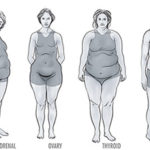
Updated on 24.07.2020
Health and beauty both start from the inside. Surely you want to look young and fresh and to keep your skin soft, smooth and glowing. Instead of buying expensive creams invest in nourishing. Food that provides the right combination of vitamins and minerals.
Like any other tissue in your body, your skin has a specific role. It requires specific nutrients to stay healthy and function properly. Although unhealthy skin doesn’t manifest through painful symptoms. If you pay attention to its aspect you can easily tell if your diet is adequate or not.
Vitamin and mineral deficiencies, as well as dehydration and junk foods, can change the aspect of your skin and make it look dry. Tired, full of wrinkles and blemishes, discoloured or hyperpigmented in certain areas. Thus, your focus shouldn’t be on creams and lotions to put on your skin. Neither on makeup to cover the imperfections. But on vitamins and minerals, as they play the most important role in a healthy complexion.
Given below are 6 micronutrients that can improve skin health. And help you maintain a youthful appearance for longer.
One of the most powerful natural antioxidants vitamin E. It’s very effective in fighting against free radicals. And preventing skin dryness, wrinkles and fine lines. Also, it prevents the damage of collagen. And protects against cell damage caused by UV rays when combined with vitamin C.
Topical vitamin E has a proven track record to exert anti-inflammatory effects. And to reduce UV-induced skin swelling, thickness, edema and erythema. This protective action of vitamin E recommends the mineral in chronic inflammatory skin conditions. Studies show that micronutrient is used either alone or in combination with vitamin C.
Vitamin E has moisturizing properties. Studies show that topical application of this compound can improve the water-binding capacity of skin cells. After constant use for 2-4 weeks.
Unlike other vitamins, this one is not produced inside the body. So the lack of micronutrient should be compensated for foods. Like vegetable oils, almonds, asparagus, sweet potatoes, spinach, or from dietary supplements.
Vitamin C plays a vital role in collagen production. So it is also responsible for keeping skin free of wrinkles, smooth and soft. This micronutrient is a potent antioxidant. Used for preventing the effects of aging and for treating hyperpigmentation. Inadequate amounts, vitamin C keeps skin firm and strong. Also contributes to a faster recovery from wounds and cuts.
Vitamin C reduces the appearance of brown spots and other types of sun damage. By protecting against the harmful effects of free radicals. Other positive effects of this micronutrient on skin include. The reduction of inflammation and irritation, which means less red spots and blemishes.
Vitamin C can be found citrus fruits, tomatoes and broccoli. The recommended daily dose is 500 mg. When you take the vitamin in low doses symptoms can occur. Such as deficiency symptoms like bleeding beneath the skin or ulcers.
Vitamin A or retinol is one of your best allies in the battle against free radicals. This natural compound protecting the skin against aging and promoting cell growth. It promotes the regeneration of skin and can be effective in reducing acne breakout. And preventing the formation of pimples.
By stimulating the production of new skin cells and the removal of old ones. And by supporting the thickening of the dermis. This micronutrient promotes the production of elastin and collagen. Both necessary for reducing wrinkles and fine lines. Vitamin A keeps the skin smooth and strong and acts as a natural exfoliator.
It’s found in egg yolks, whole milk, cream and butter. Also in meat, saltwater fish, fruits and vegetables as well as from supplements. Topical products rich in vitamin A are also helpful.
Selenium is needed in small amounts but is essential for skin’s health. It’s involved in regulating the metabolism of all cells. And has strong antioxidant properties. This mineral helps the organism fight against cell damage caused by free radicals. And can slow down the signs of aging, such as wrinkles, blemishes and skin spots, fine lines and skin dryness.
Selenium helps in treating the symptoms of acne and improves circulation. Maintaining a healthy skin texture and colour. The recommended daily dose is 55 micrograms. You will find it in either from dietary supplements or from foods like Brazil nuts, liver, tuna, mushrooms, beans and seafood.
Coenzyme Q10 is often added to skin creams and lotions. For its protective action and antioxidant effects. This natural compound is like a vitamin and is present in all body cells. Counteracting the skin cells damage caused by free radicals. Helping the body preserve its collagen and elastin stores. As a result, coenzyme Q10 contributes to a smoother, firmer and younger skin.
The compound is naturally produced inside the body. But the levels of coenzyme Q10 decrease with age. This is one of the factors that cause the skin to become wrinkled and saggy. It’s recommended to add it to your diet on a daily basis to protect your skin against the effects of aging.
The foods containing Coenzyme Q10 are peanuts, sardines, beef and organ meats from dietary supplements. In other cases, it’s used for many products as a fortifying compound.
An essential mineral required for many physiological functions. Zinc is involved in maintaining the structure of certain proteins and enzymes. Also in regulating gene expression. In the skin, it speeds up wound healing and helps repair the damaged tissue. Generally used for cuts and wounds, as well as for acne, skin sores and other minor skin lesions.
Zinc promotes the production of skin cells. Plays a role in immunity and protein synthesis, and exerts anti-inflammatory effects. The mineral is often used in sunscreens as it protects against harmful UV rays. Zinc deficiency makes skin more prone to sun damage, worsens acne and impairs the tissue’s self-regeneration ability.
Some studies have found zinc to be as effective as antibiotics in fighting against acne. Supplements of this mineral have been found to increase the level of vitamin A in blood. The positive interaction between zinc and vitamin A may explain the effectiveness of this mineral in treating acne.
To add zinc to your diet, eat kidney, liver, beef, seafood, eggs, dairy or pumpkin seeds more often. Animal sources are better for the proper absorption of this mineral. As in plant foods, zinc is less bioavailable.
Have something to add to this article? Comment below or join our Facebook community and share your thoughts with us.

Updated on: 08.09.2021 The lymphatic system is involved not only...

Stress can make you gain weight – we’ve heard this...

Various theories exist to answer this question. As you will...

Our series of whole body vibration machine exercise articles continues...

Both rebounding and jumping on a trampoline are excellent ways...